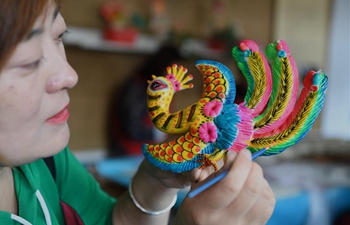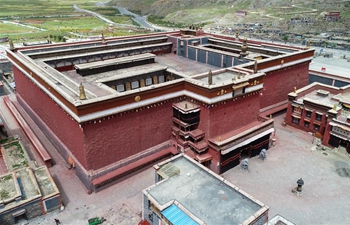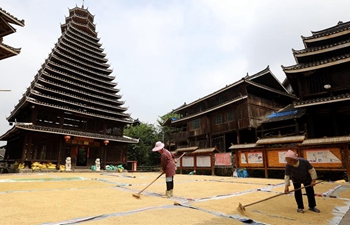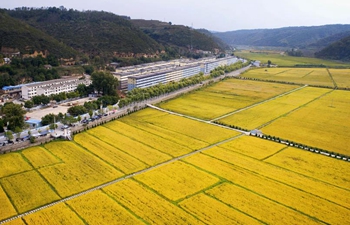NAIROBI, Sept. 14 (Xinhua) -- Mercy Mungai credits her resilience and fortitude to the climatic shocks that often strike her village sandwiched between rolling hills that dot Kajiado County, located southwest of the Kenyan capital, Nairobi.
The middle-aged mother of four, who ekes out a living through subsistence farming, has been a victim of recurrent droughts that have worsened water scarcity and food insecurity in her hamlet.
Mungai can now afford to put a smile on her face, thanks to the launch of a community water project in her locality by Kajiado county government and China Communications Construction Company (CCCC), which is implementing the Nairobi-Naivasha part of Kenya's Standard Gauge Railway (SGR) project.
The lively small-scale farmer and her two young children attended the ground-breaking ceremony for Kimuka Community Water Aid Project on Thursday at the exit of the 4.5 km SGR Ngong tunnel, where water will be tapped for supply to nearby households.
"Having lived in this county for nearly two decades, I have endured the pain of trekking long distances to fetch water for domestic use. This precious commodity has always eluded us due to frequent droughts," Mungai told Xinhua.
She is one of many who would benefit from the project, an initiative of the CCCC and Kajiado county government to help ease water supply challenges in a region inhabited by nomads and small-holder farmers.
Guo Qing, deputy general manager of the CCCC Kenya SGR Project, said that water tanks with total storage capacity of 1,600 cubic meters will be constructed to help quench thirst among thousands of households in Kajiado County.
Clean water, found when the CCCC was building the tunnel, would be channeled to the tanks for community use.
"We are proud to be part of the development of this particular water project that will enable more than 40,000 people in Kimuka area and the larger Kajiado County to access clean water," Guo said.
Mungai said the project will transform the locals' lives.
"I look forward to witnessing clean water gushing from the ever dry tap in my homestead," she said. "My children will share in this joy because they have also experienced the pain of acute water scarcity."
Community leaders in the expansive Kajiado County, which is part of Nairobi-Naivasha SGR corridor, praised the CCCC for initiating the project as part of its corporate social responsibility.
"As a community, we are proud to witness the launch of a project that will address critical water needs of people living in villages and fast growing urban centers," said Kajiado Governor Joseph Ole Lenku.
He lauded the CCCC for financing livelihood projects in his county that include feeder roads, health centers and boreholes.
Janet Teiya, Kajiado representative in the National Assembly, said the CCCC-funded water projects will have a profound impact on health, food security and productivity of local population.
"We are happy to have a water project that will greatly benefit vulnerable population groups like women, children and nomads. This water can also be harnessed to promote irrigated farming in this region," Teiya said.
Kajiado youth who mainly eke a living from herding cattle or motorcycle transport business are optimistic the CCCC-funded water project would have a lasting impact on the community.
Felix Kelembo, a 22-year-old motorcyclist, said that adequate supply of clean drinking water would stimulate agri-business in high potential sections of Kajiado County.
"The development of this region has been undermined by water scarcity and we are hopeful the scenario will change once this new project is completed. Our farmers will be able to grow fresh produce that fetch better prices in urban centers," said Kelembo.
Richard Seteki, a 22-year-old herder, said he plans to take up farming to expand his revenue base once there is adequate water supply in his family homestead.
"I am a witness to how access to clean drinking water can have a transformative effect on households living in semi-arid regions and therefore look forward to harnessing this commodity and embark on profitable farming ventures," Seteki said.
Only 35 percent of households in Kajiado County now have access to clean water.













